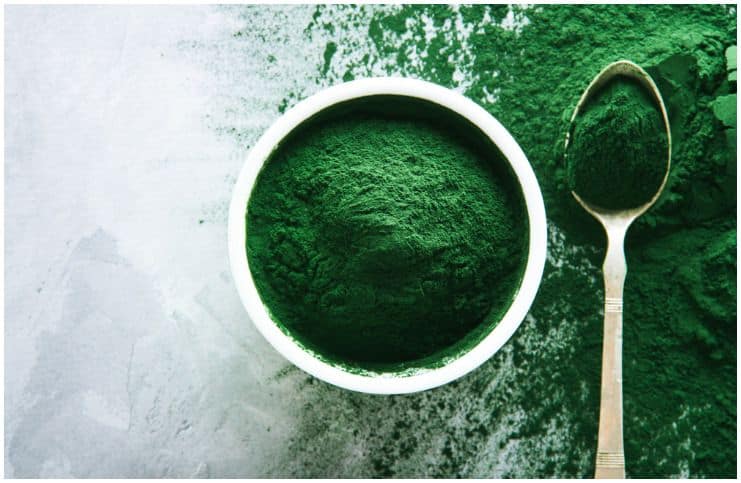Spirulina Powder – Side Effects, Health Benefits, Uses, Facts:
Facts
Spirulina is a natural “alga” (cyanobacteria) powder that is incredibly high in protein and a good source of antioxidants, B vitamins, and other nutrients.
There are two species: Arthrospira maxima and Arthrospira platensis. It is cultivated worldwide and used as a dietary supplement as well as a whole food. It is also available in tablet, flake, and powder form.
For a long time, this alga has constituted a significant part of the diet of many communities. It was a food source for the Aztecs and other Mesoamericans until the 16th century.
The Aztecs called it “tecuitlatl.” As an interesting fact, in the United States, NASA has chosen to use it for astronauts’ food in space and even plans to grow and harvest it in space stations in the near future.
This algae can be found in many freshwater environments, including lakes, ponds, and rivers.
It thrives best under pesticide-free conditions with plenty of sunlight and moderate temperature levels, but it is also highly adaptable, surviving even in extreme conditions (it is not possible to grow commercial this blue-green alga in a cold or temperate area).
Uses and health benefits of spirulina powder
In 1974, the World Health Organization described this alga as “an interesting food for multiple reasons, rich in protein and iron, and is able to be administered to children without any risk,” considering it “a very suitable food.”
The United Nations established the Intergovernmental Institution for the use of Micro-algae Spirulina Against Malnutrition in 2003.
High in nutrients
Gram for gram, means that it may literally be the single most nutritious food on the planet. It contains about 60% protein. It is a complete protein containing all essential amino acids. It also has a high supply of carotenoids, such as yellow xanthophylls and beta carotene which have antioxidant properties.
Moreover, it has a variety of necessary minerals and vitamins, including B-complex vitamins, beta-carotene, vitamin E, copper, manganese, zinc, iron, selenium, and essential fatty acids.
Vitamin B12
It is the highest source of Vitamin B-12, essential for healthy tissue and nerves, especially for vegans.
Eyes health
It is an excellent supplement for those looking to improve their eyes’ health. This blue-green alga is very rich in vitamin A, which is particularly important for healthy eyes.
For this same reason, eating more carrots has long been recommended to those looking to improve their eyes’ health, but this alga actually has 10 times the vitamin A concentration gram per gram of carrots.
Helps prevent cancer
Cancer is the leading killer of adult Americans under age 70, and in the case of this frightening disease, prevention is worth much more than a pound of cure. Spirulina may have some anti-cancer properties, particularly against a type of precancerous lesion called oral submucous fibrosis (OSMF).
Furthermore, according to the University of Maryland Medical Center, “A number of animal and test-tube studies suggest that this alga increases the production of antibodies, infection-fighting proteins, and other cells that improve immunity and help against infection and chronic illnesses such as cancer.”
Improves brain function
In a study published by the “Journal of Experimental Neurology,” spirulina was shown to reduce brain damage and aid in the recovery of neurons after a stroke in rats. A dose of 180 milligrams per kilogram of weight reduced neurological deficits and histological changes in the rats tested.
Similar research on humans, however, is needed before the benefits of it on brain function can be confirmed.
Anemia
It has a very high concentration of bio-available iron and is excellent during pregnancy and for those with anemia without causing constipation.
In a 2011 study of 40 older people with a history of anemia, supplementation with this amazing algae increased the hemoglobin content of red blood cells; immune function also improved.
Anti-aging
Antioxidants and anti-aging go hand-in-hand. This alga has a high content of vitamin E, vitamin A, vitamin B-12, calcium, iron, and phosphorus, all of which are vital for your skin’s health.
Antioxidant properties
It was tested by an independent laboratory and found to have an Oxygen Radical Absorbance Capacity (ORAC) of over 24,000 which is 4x the ORAC score of blueberries. The ORAC score is commonly used to measure antioxidant ability and concentration in different foods.
Weight loss
By regularly consuming this amazingly nutrient-dense food and low in calories (for example, one tablespoon -7 g – of this alga contains only 20 calories), you’re giving your body the raw materials it needs to keep you in perfect health and trigger the secretion of the satiety hormone leptin, to help keep your appetite in check.
You feel calm, stop craving low-quality food, and your body begins to burn more body fat naturally.
Cardiovascular benefits
It has the ability to reduce the LDL (bad cholesterol) in the body, which helps prevent the onset of cardiovascular diseases, such as hardening of the arteries and strokes. It also helps lower blood pressure.
For example, a study by the Department of Internal Medicine Greece on people with high cholesterol found that 1 gram of spirulina per day lowered LDL by 10.1% and triglycerides by 16.3%.
Reduces inflammation
Everyone knows how damaging inflammation can be to the body. Conditions like allergies, autoimmune diseases, and obesity lead to high levels of inflammation. This alga contains high levels of GLA (Gamma-linolenic acid), an omega-6 fatty acid.
Side effects of spirulina powder
Microcystins
This alga is a form of the cyanobacterium, some of which are known to produce toxins such as microcystins, BMAA, and others. Some supplements have been found to be contaminated with microcystins. Microcystins can cause gastrointestinal disturbances and, in the long term, liver damage.
Stomach pain & diarrhea
Individuals who suffer from gastric issues or abdominal gas problems could experience diarrhea, stomach pain, bowel problems, unwanted gas, hiccups, and so forth. Some people may feel very tired, fragile, or just sick, and some may experience disorientation or faintness.
Heavy metal poisoning
If the water it’s grown in contains heavy metals such as lead or mercury, the little algae will absorb the metals. Then when they are harvested and dried into a supplement, the metals remain inside the plant.
Moreover, some people may experience some of the following symptoms: dizziness (if this occurs, take less of the supplement), slight fever due to the body’s need to burn the extra protein, dehydration, loss of appetite, or stomach ache.
How to consume
It is available in powder or pill form or as flakes. Most of the supplements consumed in the U.S. are grown in a laboratory. Ask your healthcare specialist to help you determine the right dose for you. A standard dose is 4 – 6 tablets (500 mg each) per day.
Warnings and precautions
People with a metabolic condition called PKU (phenylketonuria) should avoid taking this supplement. People with this rare condition cannot metabolize the amino acid phenylalanine.
It may contain iodine, so people who are sensitive or allergic to iodine should avoid taking the supplement. For this same reason, people with hyperparathyroidism should also avoid this natural supplement.
Also, avoid taking this supplement if you have an autoimmune disease, such as lupus, rheumatoid arthritis, or multiple sclerosis, because it could stimulate your immune system, making your condition worse.
In addition to being your powerhouse of essential vitamins and minerals, this alga is a powerful detoxifying food. For that reason, it is best to start with a small dose and work your way up. Once you see how your body responds, you can then slowly increase your intake.
READ THIS NEXT:
Flavonoid Foods List: Everything You Need to Know
References http://umm.edu/health/medical/altmed/supplement http://www.ncbi.nlm.nih.gov/pubmed/23754631 http://www.ncbi.nlm.nih.gov/pmc/articles/PMC4012879/


